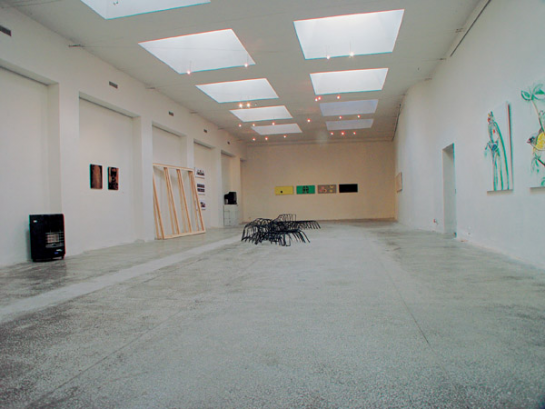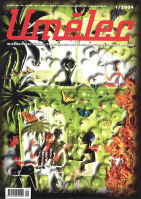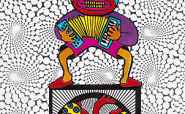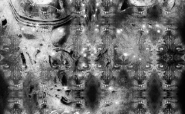| Umělec magazine 2004/1 >> Ambitious Curators Needed Immediately | List of all editions. | ||||||||||||
|
|||||||||||||
Ambitious Curators Needed ImmediatelyUmělec magazine 2004/101.01.2004 Travis Jeppesen | commentary | en cs |
|||||||||||||
|
At the moment, the biggest problem plaguing the Czech art scene is an astounding lack of curatorial vision and leadership. For evidence, one has to look no further than the overabundance of national surveys of contemporary art that we’re constantly subjected to, and are by now entirely bored with. One month it’s contemporary art from Croatia, the next month it’s Australian, the next month it’s Italian video art or Chinese photography…Very rarely do any of these shows manage to present an unbiased index of all the various trends and movements occurring within the chosen country, or relate how the particular country’s cultural production relates to an international context. Inevitably, the viewer leaves the exhibition having learned very little about the actual state of contemporary art in the respective country, pondering the validity of these national group shows, which ultimately smack of the sort of laziness and provincialism that is so prevalent in the local art scene. Why do so many local gallerists rely on this boring, inept formula time and time again? The answer is apparent enough: funding. It requires very little exertion to get funding from the government and cultural institutions of this month’s chosen country. So what country will it be next month?
This slothful approach to curating group exhibitions has developed into an uninspiring trend. It was never a very original concept to begin with, and has ultimately mutated into a cynical gesture that demeans the art-going public by telling us nothing other than “it’s not from around here.” The time has come for a resurgence of curated exhibitions based on themes other than nationality. This requires the curator to play the role of author, not only observing and cataloging trends and movements on the local level, but in a larger, international framework — as well as developing original ideas outside of all these trends and movements, thereby inspiring the development of new projects and works of art. If the local arts infrastructure is ever to develop into something worthwhile, the import/export mentality has got to go. The fact that there are so few opportunities for local artists to exhibit at home – which, by extension, prevents them from exhibiting abroad – is absolutely inexcusable. When young artists leave the academy with these negative impressions firmly embedded in their minds, they are left with little chance to grow, little impetus to nurture any creative ambition whatsoever. If we were to get rid of these ridiculous national group shows, and replace them with an overabundance of thematic group shows, so many doors would suddenly open to local artists that then, we might truly have cause to speak of a Prague renaissance. Exhibiting local artists alongside artists from outside, irrespective of nationality or generation, would also benefit local artists by introducing them to trends, artists, and art professionals from outside, thus opening the doors of possibility of exhibiting and working abroad. Many local artists have already taken a step forward and are curating exhibitions themselves. This is definitely a positive step, and proves that curating is an art in itself. Now’s the time for artists and art enthusiasts to take the initiative one step further. But where to begin? One could start by simply picking a theme of personal interest. It can be a theme that’s readily observable in the work of many contemporary artists, or, more dangerously, one that isn’t. For the moment, let’s proceed with the dangerous idea. Let’s say that, besides art, a potential curator’s main interests are fast cars and internet porn. Our curator chooses one of these themes for a group exhibition or, even more dangerously, tries to combine the two into one cohesive concept. The next step is to approach artists working in a diverse array of media, tell them the theme of the exhibition, and ask them to produce something relating to the subject. Our potential curator shouldn’t try to explain or interpret the subject for them. Let them interpret it through their work. Very few artists will turn down an opportunity to exhibit, especially if the theme fits in with their current work, or presents a direct challenge. The next step is funding, always a tricky thing. None of us are very fond of capitalism here, that much is obvious. All the same, it’s the system that we’re stuck with, so we might as well begin using it to our advantage. Instead of constantly relying on state funding, why aren’t we playing a more active role in seeking out private sponsorship from more progressive-minded corporations and wealthy individuals who have a philanthropic interest in art (or, in the case of our curator’s exhibition, the theme of Fast Cars and Internet Porn)? If it doesn’t conflict with the artists’ interests or contractual obligations, we could even envelop our proposal into a sales pitch, enticing our sponsors with the opportunity of having the first chance to purchase work from this important exhibition, which is destined to break new ground and elevate the status of all participating artists. We send out press releases to art magazines around the world. Establish contact with magazines and writers from outside of the country, and convince them that this provocative exhibition is well-worth the journey to Prague (or Brno, or wherever.) We encourage local writers to pitch reviews of the exhibition to art magazines that review international exhibitions. Chances are, the editors haven’t heard about anything going on in this region for ages, and are more than curious enough to want to know more… The fact remains that we need to get beyond these dualistic conceptions of cultural difference. What I’m addressing here is primarily the difference between being a passive observer of other countries’ cultures, and being an active contributor to a larger, international dialogue. The need to move towards self-integration versus self-segregation. Once we are able to start viewing each other as individuals instead of nationalities, that’s when the real work will begin.
01.01.2004
Recommended articles
|
|||||||||||||








Comments
There are currently no comments.Add new comment